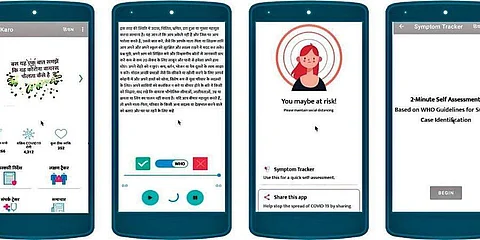

Technology is changing how we look at problems and their solutions. The world has realised this more during the global crisis that we are all going through. Dr Pravesh Biyani Associate Professor, Dr Tavpritesh Sethi and Dr Ponnurangam Kumaraguru from the Indraprastha Institute of Information Technology (IIIT), Delhi are few of those innovators who have been helping us fight the COVID-19 pandemic. The trio has been invited to join the Technology Innovation Group by the Delhi government and the Department of Health and Family Welfare. This group will develop and maintain the IT platforms (website and App) for COVID-19 management in Delhi. Dr Sethi and Dr Kumaraguru have also made an app, WashKaro, that will not just give you details about the disease and best practices to maintain hygiene, but also busts myths and fake news through it chatbot, Satya.
All three of the professors have been working in the fields of digital health and AI solutions for decades. After the lockdown ends and life starts getting back to normal, we should have an effective way of delivering public service messages to the public so that they can safeguard their health, says Dr Sethi. "WashKaro helps in that. It uses AI to filter out the wrong information and use the WHO guidelines to ratify the correct information and deliver it to the public in the local language. The idea was to equip the common man with the right information at the right time," added Dr Sethi, a physician-scientist and an Assistant Professor of Computational Biology.
The researchers introduced a new way of contact tracing, deploying the Bluetooth sensors of an individual’s smartphone and automatic recording of physical interactions with other users — this feature is not live yet. Bluetooth is being used now to alert people about social distancing — if you get too close to someone else, the app will tell you. "The public can get more information if they are feeling sick with the system tracker in the app. If they need to get tested the app will also help them by telling them where to go," he said.
The researchers have been working on fake news and its detection for more than a decade. "We have a chatbot inside WashKaro called Satya, which is an intelligent chatbot. It does not just deal with black and white answers or dump a bunch of pdfs and data on you if you ask a question. Satya can deal with fuzzy questions as well. The basic reasoning behind a chatbot is to provide concise and useful information. We kept that in mind while developing Satya," said Dr Kumaraguru, a Professor of Computer Science and Dean of Students Affairs at IIIT Delhi. "Satya is a myth-busting chatbot. Something we need at times like these. In this digital world that we live in, the threat of an infodemic is more rather than less than that of a pandemic. The good thing is that we have the WHO data to check for the right information," added the researchers.
Projects like these are possible due to better interdisciplinary research and India is taking baby steps towards it and in a couple of decades, it should be where the developed nations are at this point of time, think the professors. "We have just started teaching courses like AI, machine learning, which is dubbed as the future. We need to create a top to bottom approach where the researchers need to come together to do more interdisciplinary work and at the same time in a bottom to the top approach, we need to start courses that train the youth to be capable of working on such projects," added Dr Kumarguru.
